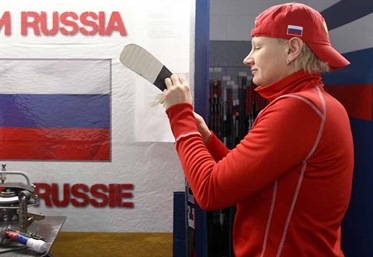Shooting for bronze
Shooting for bronze
Overtaking “barrier” key for Russia

 Yekaterina Pashkevich returned to the Russian women’s national team after a seven-year absence in 2013 to win World bronze and hopes for a medal in Sochi. Photo: Jana Chytilova / HHOF-IIHF Images
Yekaterina Pashkevich returned to the Russian women’s national team after a seven-year absence in 2013 to win World bronze and hopes for a medal in Sochi. Photo: Jana Chytilova / HHOF-IIHF Images
In the comparatively conservative and patriarchal Russian society, some sports (ice hockey and football in particular) are viewed as “purely male” and women’s participation in them is still considered by some as odd. The most popular hockey song in Russia, the country’s unofficial anthem of the sport, is called “Only Real Men Play Hockey”.
The women’s game gets little coverage in the media and little recognition from fans. In reality, however, Russian women have always been among the world’s best athletes and among the first to take up sports previously thought to be the exclusive domain of men. Hockey is no exception, and the national team has recently emerged as one of Europe’s best, its rapid growth culminating in a spectacular victory over Finland in the 2013 IIHF Ice Hockey Women’s World Championship bronze medal game.
Popular misconceptions aside, the Olympics in Sochi and a very real chance to earn a medal have necessitated a much more serious approach to the game than ever before. The appointment of a hockey legend, Alexei Yashin, as the national team’s General Manager was both a powerful symbol of the growing status of women’s hockey and a sign for the fans to start paying attention.
Still, the speed with which the Russians have burst out of obscurity into the elite has come at a price, which the team’s coaches refer to as “the psychological barrier”. To put it in simpler forms, the Russian women’s team still hasn’t got used to the idea that it can routinely defeat its main European rival, Finland. Russia hasn’t been able to duplicate its World Championship success, losing to Suomi in recent pre-Olympic tune-up tournaments.
Continue reading“Obviously, we aren’t satisfied with our results, against the Finns in particular,” says head coach Mikhail Chekanov. “They are our main opponents and we have lost to them three times in a row. Functionally, I think, we are stronger, but we are losing psychologically.”
The feeling in Russia is that the Finns, while still the favourite for the bronze, are definitely beatable. But multiplying Russia’s “psychological” problems is the fact that competition for the Olympic roster isn’t very heated in the host country. For the most part, the line-up was known long in advance and some players, in Chekanov’s opinion, underperformed without the extra motivation.
Motivation should not be a problem in Sochi, where the pressure to win a medal will be equally high both on the youngsters and on the seasoned veterans who have been in the Olympics before.
“Our goal, and I have never tried to conceal it in my 17 months as the head coach, has always been to win the bronze”, says Chekanov. “I have said this very pointedly to both the Minister of Sports and to the Russian Hockey Federation, in the person of Vladislav Tretiak. This is the goal we are working towards. And if we fail to finish third, this will be our own fault. It’s our level. All that’s left is to get the team mentally ready. Physically, they are there.”
The home team will be relying on its newfound offensive prowess to push it over the top. In the past, the Russian women have mostly concentrated on defence. But, with the coming of the new generation, including players born in the mid-1990s, and with the healthy mix of youth and experience, Russians have really picked up the offensive part of the game, especially in the forecheck. You won’t see them dump the puck out of their zone as much and trap at centre ice. Today, they try to take the initiative and apply the pressure.
Forwards like the 18-year-old Yelena Dergachyova, who was a point-a-game scorer last season, and 32-year-old Yekaterina Smolentseva, the country’s most respected female hockey star, will be looked upon to ensure Russia’s offensive presence. If defence and goaltending, Russia’s usual strengths, hold up (and goaltending in particular was inconsistent in recent months), the coveted bronze medal will become a reality.
What about challenging the North Americans, who still exist in their separate world, high above the rest of women’s hockey?
“Let’s put it this way”, says Chekanov. “Can a 1999 Lada win a race against a Mercedes? No, it can’t. On the other hand, the Mercedes can lose a wheel, so there is always hope.”
Projected Result:
The key will be defeating Sweden in the preliminary round to likely avoid playing Finland in the quarter-finals. This, and the quarter-final victory (presumably, over Switzerland) are absolute musts, and a failure to do so will be considered a catastrophe. Winning the bronze medal is the ultimate goal but the fourth place appears slightly more likely at this point.
Top-3 Players:
Yekaterina Smolentseva. The team’s emotional leader and a veteran of three previous Olympics is a star on and off the ice. She has been a fixture on the national team since the 1997 Women’s World Championship and will be heavily counted on to provide the offence Russia needs to beat Sweden and Finland.
Yekaterina Pashkevich. The 41-year-old forward is sometimes called “mommy” by her teammates, and her confidence and sage advice will be crucial for the younger players looking to overcome the “psychological barrier”. On the ice, Pashkevich, who lives in the United States, is a representative of the North American “power forward” tradition and Russia’s biggest player.
Anna Prugova. The young goaltender underperformed recently as the coaches wanted to “mentally test” her before the Olympics. But Nadezhda Alexandrova’s pregnancy – she was the expected starter until recently – will thrust Prugova into the spotlight. She will need to perform up to her considerable potential for Russia to have any hopes to medal.
Dark Horse:
Anna Shokhina. The team’s youngest player is still only 16 but she is a pure goal scorer who has the coaches genuinely excited.
Back to Overview







































